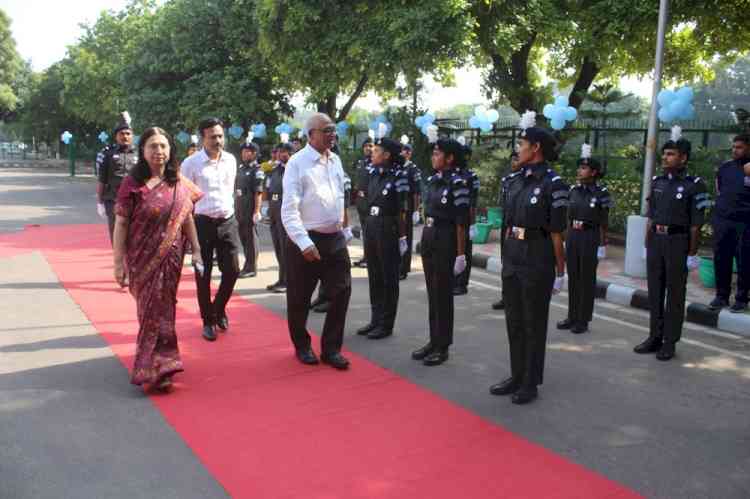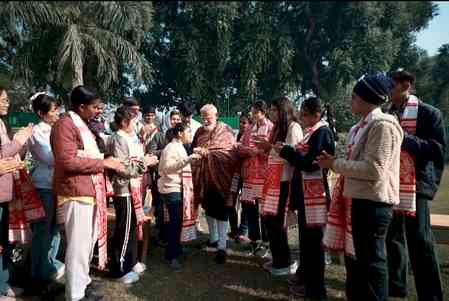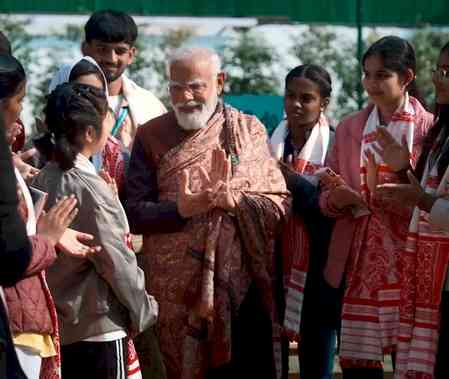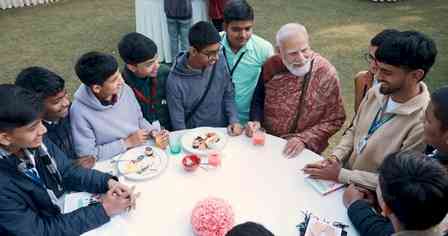BioNEST organized scientific session IV of CHASCON 2023, on Innovation-Dawn of new era, with a segment of Innovator ki Kahani
BioNEST organized scientific session IV of CHASCON 2023, on Innovation-Dawn of new era, with a segment of Innovator ki Kahani. It included a very large and diverse audience of over 1000 that had -faculty, scientists, students, start-ups, entrepreneurs, and future entrepreneurs from different institutions.

Chandigarh, October 14, 2023: BioNEST organized scientific session IV of CHASCON 2023, on Innovation-Dawn of new era, with a segment of Innovator ki Kahani. It included a very large and diverse audience of over 1000 that had -faculty, scientists, students, start-ups, entrepreneurs, and future entrepreneurs from different institutions.
Prof. Rohit Sharma Project Leader BioNEST Panjab University stated that BioNEST has always envisioned ideas turning into reality. It aims to promote start-up culture in India under Make-in Bharat and Atma-Nirbhar-Bharat campaign. He further stated that “We envision to re-direct the innovation, re-design a mind and re-channelize the pipelines of the same. To implement entrepreneurship in an academic institution and to nurture existing and potential start-ups, we are here with a humble intent to create awareness about the cause amongst the innovators.”
This panel discussion provided a foundation of ideas and understanding designed to shape the innovator’s thinking and behaviour to better appreciate the role of innovation and entrepreneurship in modern economies and academic culture.
One of the panelist Dr. Dipan Sahu, Assistant Innovation Director of Innovation Cell, Ministry of Education, & AICTE, GOI emphasized on the motto of entrepreneurs that includes initiatives to translate research output to commercial products to solve the problems of society. He quoted that we are the 5th largest in economy and 3rd Largest in the start-up ecosystem in the world. According to Global Innovation Index, India has moved from 81st position in 2015 to 40th position in 2023. To achieve this, educational institutions has made their contribution largely. He said that GOI have institutionalized the whole system where everyone should be responsible enough to understand that they have to contribute towards a system. Then, the innovation will be translated into patents, start-ups, products and social benefit. He emphasized that they started with around 300 start-ups initially and now the umber has increased up to 1 Lakh. He said that educational institutions are the epicenter of the Innovation that show ahealthy competition and has helped our economy to grow.He told about National Innovation Start-up policy (NISP) launched in 2019 that provides guidance to students for technical and non-technical streams. He explained about the program where involvement of students and faculty both are important, how they can go forward with their IP protection and pre-incubation and incubation spaces.
Another panelist Dr. Sudesh Yadav, Director, CSIR-IHBT, Palampur encouraged BioNEST, Panjab University, Chandigarh for playing a major role in creating a start-up ecosystem among northern India. He explained the major components for creating an entrepreneurial ecosystem: innovations (most important) by the Institution/ Organization, Government plays a very critical role, community, the business model and stakeholders. All these combinations are required to make a sustainable ecosystem and boost our economy. Institute of Himalayan Bioresource & Technology is one of the 37 laboratories of CSIR whose main role is to develop new technologies in different thrust areas. They have many incubation centres in which more than 60incubates and now they hold their own companies and products. He concluded that already incubated start-ups/ entrepreneurs have been providing a great motivation to upcoming scientists and researchers.
Representing One of the key stakeholder, Dr. Ashutosh Pastor, Sr. Manager & Head- Incubation, FITT, IIT-Delhi started with explaining the components of innovation ecosystem. First being, research & development, which is the foundation of any modernization. This is guarded by Intellectual property management including filing of patents/ securing your idea. At the same time, collaboration with the other organizations is very important part as not all the resources are going to be available at one spot.
Nitika Khuranna, Head-Operations, Chandigarh Angels Network (CAN), India explained ho are angels and how they provide initial support for the innovators. CAN is a group of 85+ investors which are successful entrepreneurs in US, Canada having their roots here in India. She boosted the audience by stating that if one starts a start-up, there is nothing to lose as it’s the first step we are taking towards our idea. She said that your initial investors i.e., 3 F’s are most important customers as well as believers and investors for your product.
Under the segment of Innovator ki Kahani Dr. Jagadis Gupta, Dr. Ranjana Bhandari and Mr. Abhishek Dhaliwal shared their start-up journey as a Scientific-preneuer, faculty-preneur and a start-up respectively. They explained their researches and products, highlighting how they were able to generate initial funding, their ups and down and how they never said no or didn’t stop even though the day was looking dark. The audience interacted with all the panelists till the end and also after the panel was over.



 City Air News
City Air News 










